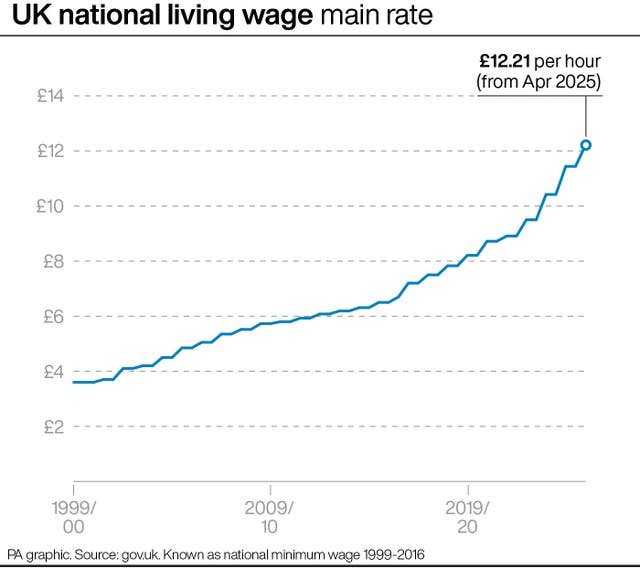Minimum wage increases for millions as business taxes rise
The Government said more than three million workers across the country will benefit from the statutory increase.

Millions of workers will receive a pay rise after the statutory minimum rate increased on Tuesday in a move unions believe will help boost economic growth.
However, business groups have cautioned over the potential impact of higher wage bills and a raft of Budget-linked tax increases that have also come into force.
The Government said more than three million workers across the country will benefit after the Chancellor announced the increase in her autumn budget last year.
Rachel Reeves has described the change as a “significant step” in the Government reaching their manifesto pledge of a “genuine living wage for working people”.
From Tuesday, the national living wage increased for everyone employed aged 21 and over, giving a pay rise of up to £1,400 over the course of a year, based on a 35-hour working week.
Under the 6.7% rise people will be paid £12.21 an hour, 77p more than the current living wage of £11.44.
Full-time workers can expect to make £26 more a week, and £117 more a month, the Government said.
The national minimum wage – which covers those aged 21 or under – will go up to £10 an hour for 18 to 20-year-olds, a 16.3% rise, and to £7.55 for 16 and 17-year-olds, an 18% increase.
TUC general secretary Paul Nowak told the PA news agency: “This increase will make a real difference to the lowest paid in this country at a time when one in six are skipping meals to get by.
“Setting out a path to end the outdated and unfair youth rates will give young workers a boost up and down the country.
“More money in working people’s pockets means more spend on our high streets – that’s good for workers and good for local economies.”
Unison general secretary Christina McAnea said: “Making work pay is vital to recharge the economy and help hard-pressed families walk a financial tightrope.
“A decent minimum wage rise gives low-paid workers greater spending power, which they can spend on their local high streets.
“That can help boost growth and get the UK back on track.”

Rachel Harrison, GMB national secretary, said: “A much-needed wage rise for millions of low-paid workers is welcome.
“But in care homes, schools, the NHS, and so many other employers, workers are still not getting the levels of pay they deserve.
“It’s time that people doing some of the most important jobs in our society start getting proper recognition – starting with decent pay.”
Campaigners pointed out that the rates were still below the voluntary so-called real living wage of £12.60 an hour and £13.85 in London, which applies to all workers aged 18 and over.
More than 15,000 businesses are accredited to the Living Wage Foundation, which sets the voluntary rates.
The shopworkers union Usdaw announced that its members in Asda Express, Foodservice and Leon will be paid the voluntary rate by October.
Baroness Philippa Stroud, who chairs the Low Pay Commission, said: “These rates secure a real-terms pay increase for the lowest-paid workers.
“Young workers will also see substantial increases in their pay floor, making up some of the ground lost against the adult rate over time.
“We recognise these increases come at a time when employers are facing increasing pressure and it is vital we monitor and assess how businesses are responding.
“As we build our evidence base for future recommendations to the Government, we will be launching a call for evidence in the coming weeks and holding in-person meetings up and down the country. I encourage all interested parties to get in touch with us.”
Nevertheless, the rise in the minimum wage will result in higher business costs as they also swallow a number of other increases from the Chancellor’s October Budget.
This includes an increase in business rates for many high-street firms due to a reduction in current discounts for more than 250,000 retail, hospitality and leisure firms.
These businesses currently receive a 60% discount on their business rates – the property tax on commercial businesses – bills up to a cap of £110,000.
However, this discount has been reduced to 25% from Tuesday.
Supermarkets, food producers and online retailers have also been hit by a new plastic packaging tax.
Retailers will be liable to pay a charge, based on weight, for every item of packaging they use in the products that they sell.
Later this week, the rate of employer NICs (national insurance contributions) will increase from 13.8% to 15%.
At the same time, firms will also pay more because the Government lowered the threshold at which companies would start paying NICs from £9,100 to £5,000.





